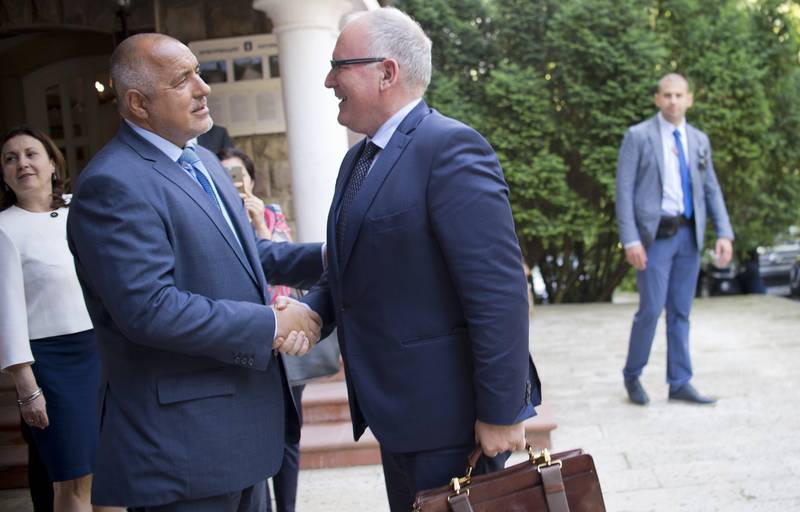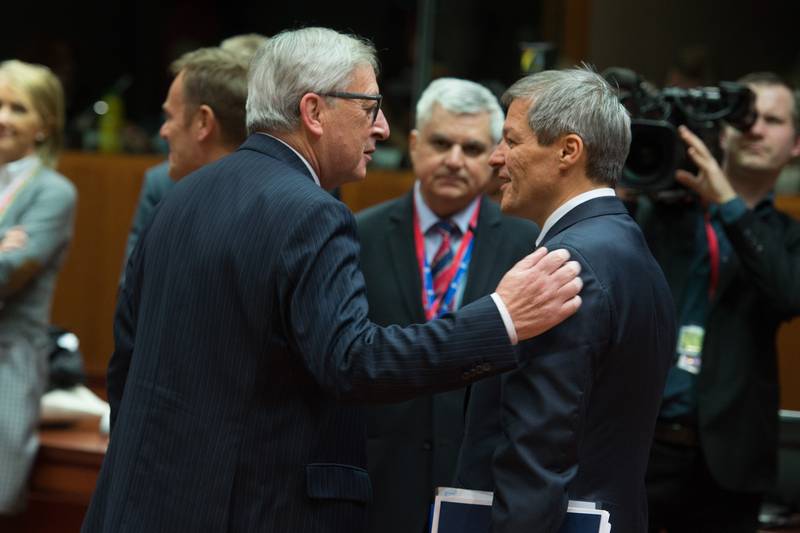Problems In Bulgaria Are Systemic, In Romania - Political
Adelina Marini, January 29, 2016
 If you could summarise the contents of the European Commission reports under the Cooperation and Verification Mechanism (CVM), published January 27th, in two sentences they would sound something like:
If you could summarise the contents of the European Commission reports under the Cooperation and Verification Mechanism (CVM), published January 27th, in two sentences they would sound something like:
- Bulgaria: Something could start to happen
- Romania: Something is happening and is gaining speed, it should not stop.
Although the EC stresses in its report on Bulgaria that there is no change in the recommendations from last year, there still is a change. The Commission is not too sure whether it is about “New Hope”, or “The Force Awakens”, but in both cases we are talking about a heavy battle with the dark side of the force. The reasons for hope and the feeling that the force is awakening are the strategy for a reform of the judiciary from January of last year; the amendments to the constitution, which, as it was expressly underlined, are far from the initially proposed; the anti-corruption law, mentioning that it was rejected to the government’s “surprise”. Beyond all this, however, the EC points out that “Many of the recommendations in the 2015 CVM report remain valid”.
The problem is clearly outlined in the report – the constantly appearing deficiencies, revealed in over 45 rulings against Bulgaria in the European Court of Human Rights, demonstrate the existence of a systemic problem. The largest focus of the report is placed on the Supreme Judicial Council, being a key institution to the independence, professionalism, and efficiency of the Judiciary. Prosecution is also mentioned as a weak link in the system. On every painful problem that the Bulgarian public has been dealing with during the entire 2015, the EC showed that it had made the relevant recommendations in previous reports.
If one is to read only the Bulgarian report, one could easily be deceived that the problem with repetitiveness of contents is not so large. When you read the Romanian report, however, the picture becomes entirely different. Bulgaria is shown as constantly occupying the last place in the EU in the corruption index. According to the latest Transparency International report, Bulgaria ranks 69-th. This is lower than even one of the candidate states – Montenegro. The difference this year, however, is that authorities have finally admitted to having a problem. This, according to the EC, happened with the adoption of a comprehensive national strategy for fighting corruption.
This is, however, a very short step in the background of the conclusion that the national coordination council, created to coordinate efforts in the fight against corruption, is actually a toothless institution, which does not bask in political support at the highest level. Regarding another key benchmark in the Mechanism – fighting organised crime – even this small step is lacking. There is a hint, however, at who is to blame – the prosecution. “There has been a tendency of high-profile cases involving initial charges of serious wrongdoing being subsequently overturned or delayed in the courts or terminated by the prosecution, citing lack of sufficient evidence or procedural issues”, says a footnote regarding Bulgaria’s efforts at battling corruption at the high levels. The conclusion is identical regarding organised crime – “However, cases involving serious organised crime continue to be hampered by complex provisions and formalistic criminal procedures”.
At the same time, the EC spares no compliments on Romania’s achievements, outlining the main engine of reform: “The track record of the key judicial and integrity institutions to address high-level corruption has remained impressive. The judicial system as a whole has continued to show its professionalism, including a capacity to adapt to significant changes in the civil and criminal codes, efforts to unify jurisprudence and a willingness to defend the independence of the judiciary. Romania has made further progress towards the CVM benchmarks”, says the report. In it, same as last year, there is no lack of truly impressive figures – the anti-corruption agency has initiated 1250 indictments over the course of 2015, among which a prime minister, former ministers, members of parliament, mayors, city council chairmen, judges, prosecutors, and many other high-ranking politicians.
Last year, the EC criticised Romania for the fact that the large number of indictments does not match the moneys collected from confiscating assets. This year there is no such criticism. It is noted that the sum of frozen assets in opened cases amounts to 452 million euro. The EC recognises the huge progress in identifying corruption at the local level. Since 2013, the total number of people sent to court for corruption is close to 100 mayors, over 20 city council chairmen, and dozens of local bureaucrats. The cherry on the cake is the arrest of the mayor of Bucharest last year. According to the EC, his arrest was “the strongest illustration of this problem”. In other words, the battle against corruption in Romania is evolving and is already showing some serious progress on local level as well.
Why is Romania succeeding and Bulgaria isn’t?
The answer is hidden precisely in the comparison of the two reports. About Bulgaria it is said that there is a problem with appointments, while the Romania report shows why this is a problem: “Clearly the leadership of those institutions has played an important part in this [battle against corruption], sometimes in the face of strong personal criticism. Hence the emphasis placed on transparent and merit-based selection procedures as a way to provide robust leadership, avoid political interference in senior appointments and support judicial independence”. While the Bulgaria report says: “However, other appointment decisions of the SJC continued to raise concerns about lack of transparency and possible undue influence”. It is noted that clear criteria for appraising appointments are lacking, which is “opening the door to doubts about the objectivity of appointment procedures”.
 In addition, the Romanian report says something else, which answers the question why it is working in Romania, and not in Bulgaria: “The 2015 report saw the nomination of a new Chief Prosecutor for the Directorate for Investigation of Organised Crime and Terrorism as an important test case. The procedure was eventually finalised with little controversy: it was characterised by increased transparency and predictability (publication of post, criteria publicly defined, names of candidates published), and benefited from clear cooperation between the Minister of Justice (responsible for choosing the candidate) and the Superior Council of the Magistracy. It therefore provided a good example of how clear and robust procedures, with the full involvement of the key authorities, can be the most important factor in a credible appointment process (although procedures must also be strong enough to cope with a situation where the key institutions are in disagreement)”.
In addition, the Romanian report says something else, which answers the question why it is working in Romania, and not in Bulgaria: “The 2015 report saw the nomination of a new Chief Prosecutor for the Directorate for Investigation of Organised Crime and Terrorism as an important test case. The procedure was eventually finalised with little controversy: it was characterised by increased transparency and predictability (publication of post, criteria publicly defined, names of candidates published), and benefited from clear cooperation between the Minister of Justice (responsible for choosing the candidate) and the Superior Council of the Magistracy. It therefore provided a good example of how clear and robust procedures, with the full involvement of the key authorities, can be the most important factor in a credible appointment process (although procedures must also be strong enough to cope with a situation where the key institutions are in disagreement)”.
Kudos for Romania! It can even do better! Can Bulgaria perform at all?
The pronounced contrast between Bulgaria and Romania was also evident in the wording of the first vice-president of the EC, responsible for the rule of law and thus for the CVM, Frans Timmermans (The Netherlands, Socialists and Democrats), which he used in the presentation of the reports to a limited circle of interested correspondents in Brussels. About Bulgaria he said: “Last year Bulgaria took some important steps to put reform back onto the agenda. Now it is time to move to the next stage by turning the strategies on judicial reform and the fight against corruption into action on the ground and delivering concrete results. [...] 2016 must be the year when Bulgarians feel progress on the ground. Seeing real results in tackling high level corruption and organised crime cases remains Bulgaria's biggest challenge and must be the highest priority”.
The words of Mr Timmermans on Romania had a totally different tone: “Over the last year Romania and Romanians have shown their willingness to fight corruption and to protect the independence of the judiciary. The mass demonstrations against corruption have shown how these issues matter to Romanian citizens. Over the last year we have seen the professionalism, commitment and good track record of the judiciary and the anti-corruption prosecution and reforms being internalised. I am encouraged to see that Romania continues to make reforms and the positive trend continued in 2015”.
Not everything is so peach-perfect in Romania, where political powers continue to be a major hindrance. In 2015, the parliament has dismissed around one third of the anti-corruption agency’s requests for withdrawal of MP’s immunity, so that it could start enquiries against them, or detain them in preliminary arrest. The report points out that this is a problem that has been addressed in previous CVM reports as well, as euinside informed you every time. Ministers have kept their positions, regardless of charges being pressed, and MPs with definitive sentences for corruption has stayed in their places. This will continue to be the greatest challenge for Romania. The good news is that, thanks to Poland, the subject of rule of law is very high on the agenda of the Council’s presidency, where in May there will be an annual discussion on the state of rule of law.
It would be great if it does not finish with the condition of rule of law in Poland, but also discusses the CVM and what is lacking in Bulgaria and Romania, so that the tasks set in 2006 to the two countries are accomplished. The EC, despite setting a course towards politicising, has approached the assessment of Bulgaria and Romania under the CVM in an extremely technocratic and objective way, which is probably the best piece of news in the presentation of  this year’s reports. The bad news is that they once more got presented without the publicity that we had gotten used to before the change of the Commission’s staff.
this year’s reports. The bad news is that they once more got presented without the publicity that we had gotten used to before the change of the Commission’s staff.
Another shortcoming of the report, especially on Bulgaria, is that it does not mention the efforts of civil society, which are to a large degree the reason for the ray of hope and for the awakening of the reformist power. It is true that in Bulgaria society fails to organise such mass protests against corruption like in Romania, but there are already civil organisations, which have dedicated themselves to making the fight against corruption and organised crime a number one priority for the government.
The common denominator between Bulgaria and Romania in this year’s appraisal is that the root of the problems in both countries is the political class. In Romania, the genie of independence of the judiciary has been set loose from the bottle as a result of a fortunate political coincidence, but now the political class is trying by all means to put it back in. In Bulgaria, on the other hand, everything possible is being done to avoid the possibility of loosening this genie from the bottle. This is why, Bulgaria continues to be the poorest and most corrupt state in the EU in a moment of heavy challenges facing the Union. After the presentation of the reports, which name the problems quite clearly, it is the Council and the European Parliament’s turn. Both – political bodies.
Translated by Stanimir Stoev
 Entrance to the Berlaymont building | © EC - Audiovisual Service
Entrance to the Berlaymont building | © EC - Audiovisual Service | © European Union 2020, EC - Audiovisual Service
| © European Union 2020, EC - Audiovisual Service Commission President Ursula von der Leyen | © European Union 2019 - Source: EP
Commission President Ursula von der Leyen | © European Union 2019 - Source: EP